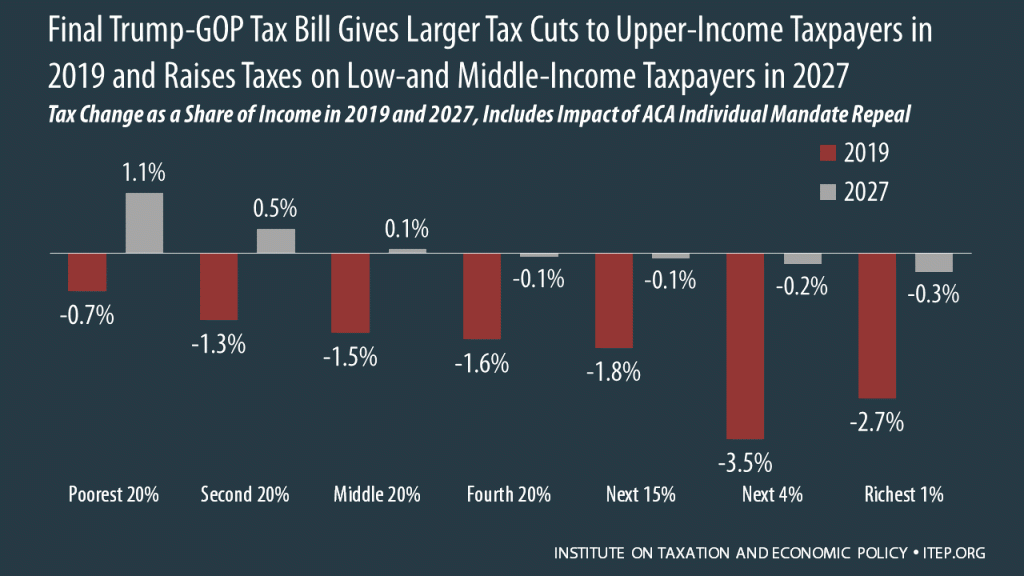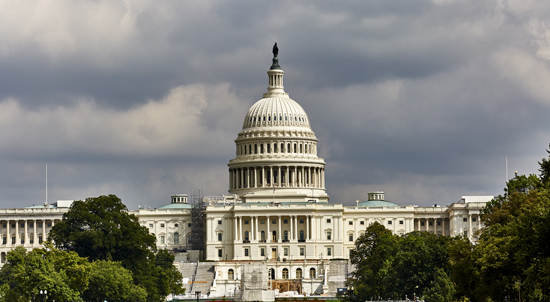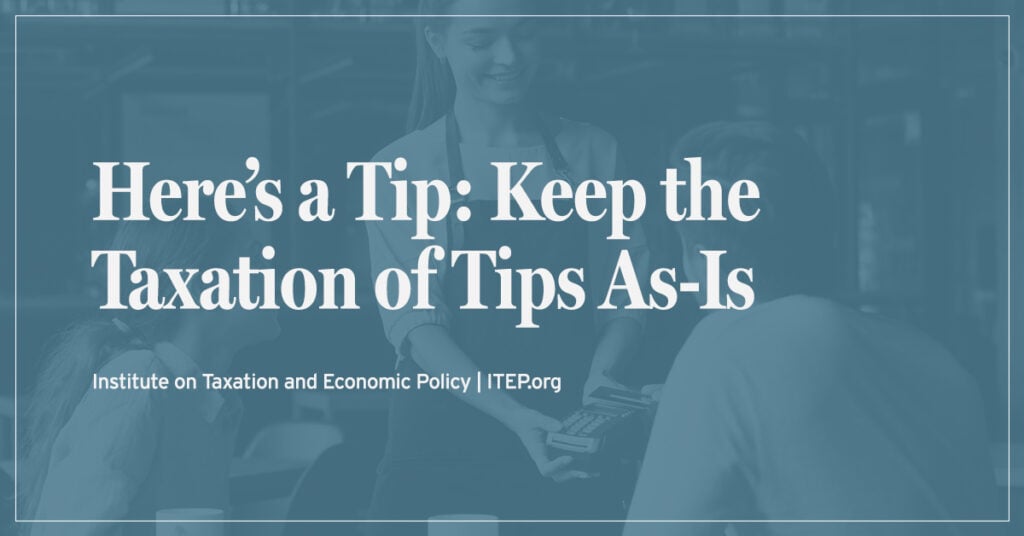Statement of Richard Phillips, Senior Policy Analyst
Institute on Taxation and Economic Policy
Before the Committee on Ways and Means Subcommittee on Tax Policy
Hearing on “Post Tax Reform Evaluation of Recently Expired Tax Provisions”
March 14, 2018
Chairman Buchanan and Ranking Member Doggett:
On behalf of the Institute on Taxation and Economic Policy (or ITEP) I would like to thank you for holding this hearing to evaluate recently expired tax provisions, which are widely known as the tax extenders. It is long past time for the tax extenders to be evaluated and then either be allowed to expire or to be paid for and made a permanent part of the tax code. If we want permanency in the tax code, this will also mean looking beyond recently expired tax provisions to those significant portions of the tax code that are now set to expire due to the Tax Cuts and Jobs Act.
ITEP is a non-profit, non-partisan research organization that provides timely, in-depth analyses on the effects of federal, state, and local tax policies. ITEP’s mission is to ensure the nation has a fair and sustainable tax system that raises enough revenue to fund our common priorities, including education, health care, infrastructure and public safety. For more than 35 years, ITEP has provided in-depth research and analysis of the tax code, including on the tax extenders. I am honored to continue this work on behalf of ITEP by submitting this testimony to the Subcommittee today.
Introduction
Congress has made a nearly annual tradition of continually passing short-term extensions of a series of temporary provisions in the tax code. This tradition has long been anathema to the creation and maintenance of a fair and sustainable tax system. While a lot of excuses are given for this, the true reasons behind this practice are clear.
First, the goal of passing tax breaks on a temporary basis is to hide their true long-term fiscal cost. For example, the cost of providing a 7-year recovery period for motorsports entertainment for just 2018 is $6 million, while making it permanent would cost $504 million over the next ten years. Overall, the cost of extending all the expired 2017 provisions in 2018 would be $4.2 billion, while making them permanent would cost $92.5 billion over the next ten years.[i] Some lawmakers want to maintain the appearance of fiscal prudence by only increasing the deficit for these tax breaks a couple of years at a time, but the reality is that their continual extension is increasingly costly and fiscally imprudent.
Second, the passing of these tax provisions is driven by a problematic relationship between lawmakers and the special interest backers of these provisions. The former director of ITEP, Bob McIntyre, rightfully referred to the semi-annual passage of the tax extenders as the tax lobbyist full employment act. Passing tax provisions repeatedly on a short-term basis only makes sense if the goal is to maintain the attention of special interest lobbyists. We need to remove the special interests from the tax policy making process and one of the most important first steps to accomplish this would be to end the tax extenders tradition once and for all.
Framework for Evaluating Temporary Tax Provisions
While there is certainly room for improvement, major government programs are typically subject to several layers of oversight, evaluation, and reform on an ongoing basis. In contrast, expenditures of equal size and impact in the tax code are rarely subject to much if any scrutiny and evaluation. This lack of evaluation has been especially true for the tax extenders, which have historically been passed as a package in a rushed fashion, allowing numerous provisions to pass and remain in effect for years without any serious evaluation of their merits.
Moving forward, lawmakers should consider the following three questions when evaluating the passage of any tax provision, temporary or otherwise.
- Does the tax provision serve a compelling public interest?
2. Does the tax provision achieve a compelling public interest in a cost-effective way?
3. If the passage of a tax provision is worthwhile, how should it be paid for?
A compelling public interest?
One of the principles of an ideal tax code is horizontal equity, meaning that taxpayers with similar income and assets should pay the same amount in taxes. The only reason to deviate from this practice should be that doing so serves some compelling public interest. For example, the child tax credit causes individuals with the same income and assets to pay a different amount in taxes based on whether they have children. This clearly serves a compelling public interest because it helps families support and care for children.
In contrast, many of the tax extenders have historically been created to benefit narrow public interests, not the broad public interest. For example, one of the tax extender provisions under discussion today provides owners of racehorses millions in tax breaks each year. While certainly beneficial to a narrow set of racehorse owners, this provision serves no broad public interest to justify the special treatment of the owners of horses over owners of other assets.[ii]
Cost effective?
If a tax provision does theoretically serve a broad public interest, the next question should be whether it is doing so in a cost-effective way. Many provisions in the tax code and many of the tax extenders were put in place to serve a noble purpose, but simply do not achieve this purpose in a cost-effective way. For example, the idea that there should be a tax incentive to help economically distressed urban and rural areas makes sense, but the empowerment zone tax incentives created to serve this purpose have not been effective in helping distressed areas. The problem with empowerment zone tax incentives, as well as many other tax incentives, is that they often provide a windfall to companies and individuals who would have engaged in the desirable activity regardless of the tax incentive, rather than encouraging more of the desired activity.[iii]
It is worth noting that none of the recently expired tax provisions passed as part of the budget deal are likely to be at all effective because they were extended retroactively. It strains credulity to assert that these provisions created incentives, even though they were not in effect until after the time that they are supposed to impact.
Each and every temporary provision of the tax code should be subject to an independent cost-benefit analysis. Permanent tax expenditures in the code should also be subject to periodic analyses. If a provision is found to not be cost effective, then it should either be reformed to make it more effective or simply allowed to expire.
Paying for It?
The most basic task of the federal tax code is to raise enough revenue to fund the federal government. Years of tax cuts, however, have made it so that our tax code brings in substantially less revenue than is needed to cover the public investments we need. Under current law, the federal government will face a deficit of around $12.3 trillion[iv] over the next ten years, which does not even include additional funding for new investments in healthcare, education, and infrastructure that our country needs to prosper. There is a crucial need for Congress to raise a significant amount in revenue going forward and Congress should certainly not make the deficit worse by piling on additional tax breaks on top of the trillions in tax breaks passed most recently in the Tax Cuts and Jobs Act of 2017[v], the Protecting Americans from Tax Hikes Act of 2015[vi], and the American Tax Payer Relief Act of 2012.[vii]
If a temporary provision of the tax code serves a compelling public interest and is found to be effective at achieving that goal, then it is worth paying the costs of making that provision a permanent part of the tax code. One of the ways that the tax extenders have managed to avoid scrutiny is that lawmakers have not had to confront the tradeoffs associated with paying for them. Put simply, any provision that is not worth paying for should not be temporarily extended or made permanent.
Recommendation for Dealing with Temporary Tax Provisions
In summary, lawmakers should immediately begin a detailed analysis of each of the recently expired tax provisions at issue in today’s hearing to determine whether they serve a compelling public interest in a cost-effective manner. If a provision does not meet these standards it should be allowed to remain expired. The most obvious candidates for this treatment would be the tax breaks for race horses, motorsports entertainment complexes, special expensing for certain film, television, and live theatrical productions, and the empowerment zone tax incentives. If a provision does prove to be effective, then it should be made a permanent part of the tax code, but at the same time it’s cost should be offset by an increase in revenue from either broadening the tax base or raising tax rates.
Bringing Permanency to the Tax Code
The failure of lawmakers to bring permanency to the tax code is by no means limited to the 28 recently expired provisions that form the primary basis of today’s hearing. A recent analysis by the JCT listed 80 provisions in the tax code that are set to expire at different times over the next 10 years.[viii] While 26 of the provisions that form the subject of today’s hearing would cost $92.5 billion to extend over the next ten years,[ix] many of the other provisions set to expire over the next ten years would cost hundreds of billions of dollars over the long run.[x]
If there was one minimum goal that tax reform legislation should have accomplished, it was a reduction in the number and scope of the provisions of tax code that is temporary.[xi] Unfortunately, the Tax Cuts and Jobs Act greatly expanded the number of temporary provisions of the tax code.[xii] In fact, after 2025 virtually all of the individual tax provisions of the act are set to expire. In addition to the expiring provisions, the Tax Cuts and Jobs Act includes a variety of provisions that raise revenue after 2025 (such as the increase in the Base Erosion and Anti-Abuse Tax rate from 10 to 12.5 percent) that lawmakers and special interests will seek to stop from ever going into effect. Rather than creating stability and predictability in the tax code, the Tax Cuts and Jobs Act has set Congress up for years of debates over many more temporary provisions in the tax code.
Some lawmakers may argue the answer to the problems created by making significant portions of the Tax Cuts and Jobs Act temporary is to simply make all these provisions permanent. For these lawmakers, the issue was simply that some provisions had to be made temporary due to Senate budget rules and should be made permanent going forward. But making all the temporary provisions of the Tax Cuts and Jobs Act permanent is not sustainable and thus does not guarantee any real permanency in the tax code. As discussed above, under current law the United States faces a deficit of roughly $12.3 trillion over the next ten years, which means that current tax law will almost certainly have to change substantially to prevent a historic increase in our national debt. Making all the Tax Cuts and Jobs Act provisions and other temporary provisions permanent would make the tax code even more unsustainable by increasing the projected deficit by an additional $1.2 trillion.[xiii] In other words, if Congress were to make permanent all the temporary tax provisions today, fiscal reality will force them to overhaul that tax code again in a few years to raise more revenue.
To create real permanency in the tax code, Congress should embrace a real tax reform effort. This means setting the tax code on a fiscally sustainable path and ending the use of temporary provisions to cover up the real cost of tax breaks.
[i] Joint Committee on Taxation, “Federal Tax Provisions Expired in 2017,” March 9, 2018. https://www.jct.gov/publications.html?func=startdown&id=5062
[ii] Department of Treasury, “Report to Congress on the Depreciation of Horses,” March 1990. https://www.treasury.gov/resource-center/tax-policy/Documents/Report-Depreciation-Horses-1990.pdf
[iii] Congressional Research Service, “Empowerment Zones, Enterprise Communities, and Renewal Communities: Comparative Overview and Analysis,” February 14, 2011. https://www.everycrsreport.com/files/20110214_R41639_b18ae5bf0fbe93505d7b6c2b13b744b76124b9ed.pdf
[iv] Committee for a Responsible Federal Budget, “Updating the U.S. Budget Outlook,” March 2, 2018. http://www.crfb.org/papers/updating-us-budget-outlook
[v] Institute on Taxation and Economic Policy, “The Final Trump-GOP Tax Plan: National and 50-State Estimates for 2019 & 2027,” December 16, 2017. https://itep.org/finalgop-trumpbill/
[vi] Citizens for Tax Justice, “Why Lawmakers Should Say No to Tax Extenders, Yes to the Working Families’ Tax Credits,” November 23, 2015. https://www.ctj.org/why-lawmakers-should-say-no-to-tax-extenders-yes-to-the-working-families-tax-credits/
[vii] Citizens for Tax Justice, “Revenue Impacts of the Fiscal Cliff Deal,” January 3, 2013. https://www.ctj.org/revenue-impacts-of-the-fiscal-cliff-deal/
[viii] Joint Committee on Taxation, “List Of Expiring Federal Tax Provisions 2016-2027,” January 9, 2018. https://www.jct.gov/publications.html?func=startdown&id=5057
[ix] Joint Committee on Taxation, “Federal Tax Provisions Expired in 2017,” March 9, 2018. https://www.jct.gov/publications.html?func=startdown&id=5062
[x] Committee for a Responsible Federal Budget, “Updating the U.S. Budget Outlook,” March 2, 2018. http://www.crfb.org/papers/updating-us-budget-outlook
[xi] Richard Phillips, “How the Latest Budget Deals Expose the Failure of “Tax Reform”,” Just Taxes Blog, February 9, 2018. https://itep.org/how-the-latest-budget-deals-expose-the-failure-of-tax-reform/
[xii] Ibid.
[xiii] Ibid.





